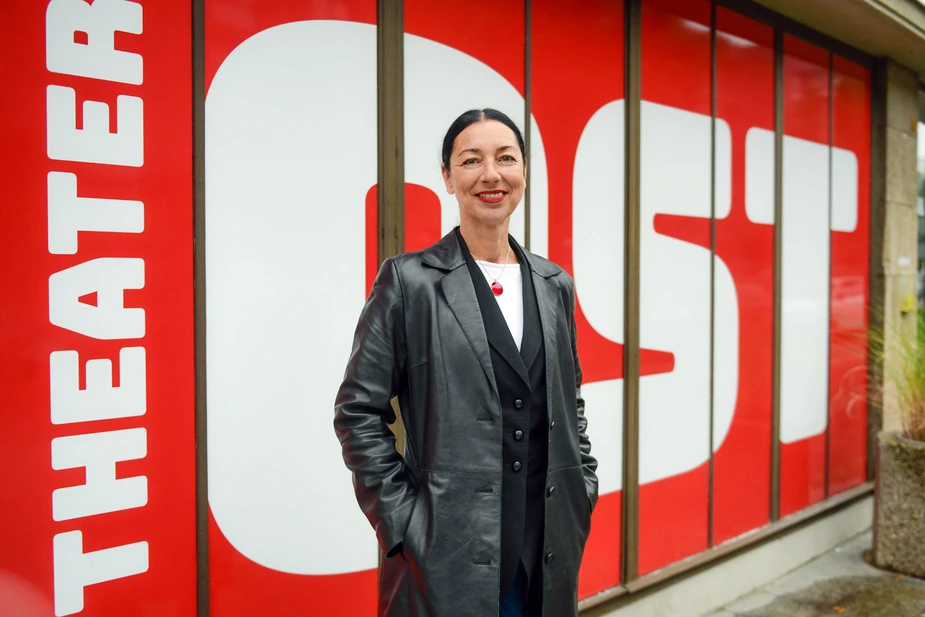A happy ending for Theater Ost
A cultural mainstay of Adlershof finds safety in its old, new home
Ever since the Berlin Wall fell, the landmarked building on Moriz Seeler Strasse was up for sale on the condition that it was used either for culture or media. “What was missing,” says Kathrin Schülein from Theater Ost that is now located there, “was a culture-obsessed investor.” Initial contacts with an interested party had been made as early as 2008. However, he decided not to buy. Adlershof was a bit too suburban. A lot has happened since then. In August 2020, the building was sold, refurbished according to its landmarked status, and received an extension. Theater Ost started the new season with a reading by the grand seigneur of the “Aktuelle Kamera”, Klaus Feldmann, and a new production of its own—for the first time with the security of its old, new home.
Her efforts are finally bearing fruit. “If I learned one thing,” says a relaxed Kathrin Schülein, “it’s not to be put off even when there are obstacles in my path. There is solution for everything. Perseverance pays off eventually.” Nobody talks about the lack of urbanity even more. Thousands of new apartments have been created in the Science City. Their inhabitants are filling the neighbourhood with new life. Well-planned residential projects, a lot of green, many ways of transportation, and diverse culinary offerings nearby.
For years, Schülein and her team of dancers, actors, singers, and technicians have invested time, nerves, and a lot of money to put on shows at the theatre and to thus contribute to preserve the building. She fought for his house of history—even theatre history—for more than ten years. Built in 1952 as a television theatre, the two-storey house saw comedy and operettas before it later became the—only preserved—TV studio of “Aktuelle Kamera”, East Germany’s main news programme. With its large hall, galleries, control rooms, and the representative lobby, it is an important example of modernist architecture in East Germany.
Apart from the building manager, who had his office here, Schülein was the only person filling this old building with life, which she did with her dance school and company “art changé”, founded in 2011. The former theatre is hidden behind mirrors in the dancing room. “One day I had a flash of inspiration,” says the student of the famous East German dancer Gret Palucca. “Why make theatre elsewhere if there’s one right here. Nobody knew exactly knew what that meant,” she remembers. After a quiet start, Theater Ost had started to establish itself after two, three years. In year four, the place was humming. “Ten out of twelve events every month were sold out,” says Schülein proudly. Then came the question: “Do you want the large room?” Much too big, she thought. “After all, I was doing everything myself.”
In 2017, panic ensued. An investor was finally found. Her first reaction: “I’m not going anywhere. Even if I have to chain myself to something.” But the investor turned out to be a piece of luck. He was exactly the culture-obsessed investor that Schülein always wished for. The building was bought by Stefan Klinkenberg. “He even let us keep the old contract as long as the building had not been renovated,” says Schülein, visibly happy with how things turned out. Things are happening for Theater Ost.
After two years of the pandemic filled with uncertainty, there are finally signs of relief. “Theatre to go” was one of the ideas from that time. But: “Nothing was allowed,” says Schülein. Culture was shut down. There was a small glimmer of hope during the loosening of the restrictions in summer 2020. They rented and set up a theatre tent, only to shut it down after just a few shows when the lockdown returned. Another thing was particularly unfortunate: a staging of Till Eulenspiegel that had been produced for being shown outside had to be postponed to the opening of the new open air stage next year. And even today, the theatre is feeling the fallout of the pandemic. Many cultural workers have changed jobs. There is lack of actors, sound technicians, and lighting engineers. The audience, too, has been cautious.
Schülein has now channelled her experience form the pandemic into an initiative that she started with eight other artists called “Kultur ins Grundgesetz” (“Culture in the Constitution”). “Culture,” she says, “shouldn’t be a voluntary task of the federal and state governments. It should be made a basic right. Accessible and affordable for all.” Theatre makers and artists in East and West Germany support the initiative, as does the German Stage Association, the German Cultural Council, the ver.di trade union, and the Conference of the Ministers of Education have voiced their support for Schülein’s cause. The initiative is currently still collecting signature for a petition in December. Schülein needs 50,000 of them. But she will persevere and not let anybody put her off.
Rico Bigelmann for Adlershof Journal
